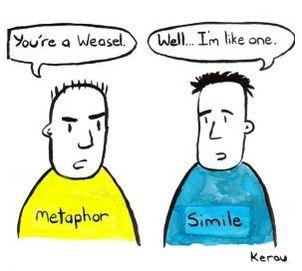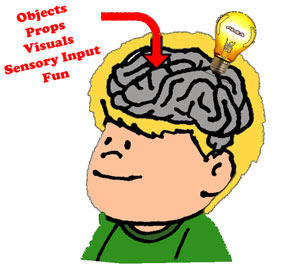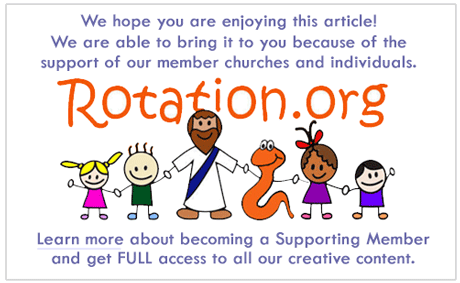What is an "Object" Lesson?
 Many teachers use "object lessons" all the time and don't realize it, in part because they don't know what an object lesson is, or assume it is something fancier than it really is. But once you know "what it is and how they work" you will probably get even better at teaching with them!
Many teachers use "object lessons" all the time and don't realize it, in part because they don't know what an object lesson is, or assume it is something fancier than it really is. But once you know "what it is and how they work" you will probably get even better at teaching with them!
DEFINITION:
"Object Lessons" are concepts illustrated with physical objects (props).
In an object lesson, the teacher displays, plays with, or points out something about the object that provides a clue and focal point for the concept you want to share. The object functions as a memory hook.
Sometimes, the object's properties become a "metaphor" for the concept you want to teach. Take that fish lure up above, How do we "fish for people"? What about the Good News "hooks" them? To extend that metaphor, I'd bring a fishing rod and do some "casting for kids" with my lure. (Of course, I wouldn't use real hooks.) Each of the props in my object lesson --the person fishing, the rod, and the lure, can have metaphorical meanings.
But objects in an object lesson don't have to be metaphors. An object can just be a prop in a story. For example, you could hold up a shoe to tell a story about the time you couldn't find your shoe, and the shoe just represents a shoe. But you could also turn that shoe into a metaphor by having kids toss their shoes into a pile, and then toss your one shoe off to the side to represent the "lost sheep shoe." See more examples below.
Some metaphors are easy to understand, others are hard. For more about using metaphors with children, read our teacher training article. "Unpacking Metaphors with Children."
Examples of Object Lessons where the object is a metaphor:
THE OBJECT: "Look at the birds of the air."
METAPHOR:: Comparing the birds to you. "Your Father in heaven takes care of them, and you are worth much more than birds."God will take care of your needs. (Remember: Jesus was outdoors when he said this. He was likely pointing to real birds -- objects/props.)
OBJECT: I brought in my stuffed animal SHEEP today. See how he wanders off?
METAPHOR: Comparing us to the sheep. Where do we wander? How do we stay on right paths? How does God shepherd us?
OBJECT: This bread...
METAPHOR: ...is (like) my body, broken for you.
Yes, The Last Supper and Communion is an object lesson that's also a metaphor. Jesus didn't just talk about the bread, he held up the object, broke it, and passed it around so we could taste it.

Object Lessons typically turn objects into metaphors (or "similies" if you want to be technically correct).
A simile is a metaphor with the word "like" added to emphasize that we are "comparing" one thing to another. You are not really a weasel anymore than God really is a "rock." God is "like" a rock. Strong, solid, able to stand up to storms.But the problem with "rocks" is that they can also be dumb, hard, dangerous, and hurt if one lands on you. So is "rock" really the best metaphor for God?
...Probably not to kids.
Examples of Object Lessons where the object is NOT a metaphor:
Here is the ball I was looking for when I discovered my friend was crying. (You can't very well bring in your crying friend, so you bring in props from the story to help kids visualize the story.)
Here is my favorite toy, what's your favorite?
Here is the Christmas gift I received and how it made me feel. What was your favorite gift? How do you feel/respond when you receive a gift?
Here is a shepherd's crook, see how a shepherd can gently reach out to guide a sheep? How does God guide us? (not by a crook!)
We use objects in our lessons because metaphors (similies) are harder for children to understand and remember without the visual, tangible references.
Without the object: "Faith is like a plant, what do you know about plants?" (followed by blank stares)
 With an object: Faith is like THIS plant I have here. See me plant it in good soil, give it sun, water and feed it. How is church like this soil you're sticking your fingers in? Here, help me water it now. How is scripture like this water? Etc., etc.
With an object: Faith is like THIS plant I have here. See me plant it in good soil, give it sun, water and feed it. How is church like this soil you're sticking your fingers in? Here, help me water it now. How is scripture like this water? Etc., etc.
Objects don't always have to be "things," they can be tastes or emotions, for example. The educational theory that our brains have "multiple intelligences" expands the idea of "object" by including "objects" like moving/motions, handling/touching, tasting, singing, acting out. While using tangible objects are always a good idea, it's not just the "appearance" of the prop that is the teaching point.
For example, a stuffed-animal sheep becomes the "object lesson " in a Psalm 23 lesson when you begin to move it around and go off path, get stuck, lie down in green pastures, etc.
YOUR LIPS and written words = The least effective "objects" in your teaching arsenal. ![]()
Object Lesson Rules of Thumb:
- Use objects/props whenever you can.
- Vary the materials and media of your objects. Acting, motions, and songs can function like the "object" in your lesson.
- Keep metaphors simple.
- Make sure the objects clearly illustrate the metaphor, and don't over-talk the point to try to cover up the fact that the object isn't good.
- Make all your objects hands-on, fun, and thus, memorable.
I hope these insights help your teaching
<>< Neil
Neil MacQueen is a Presbyterian minister who has been working with children and youth for several decades and helped create the Rotation.org website.
Read his article: "7 Tips for Better Children's Sermons"
Read "Yes, Children Can Understand Metaphors -- Here's how to help them!"






